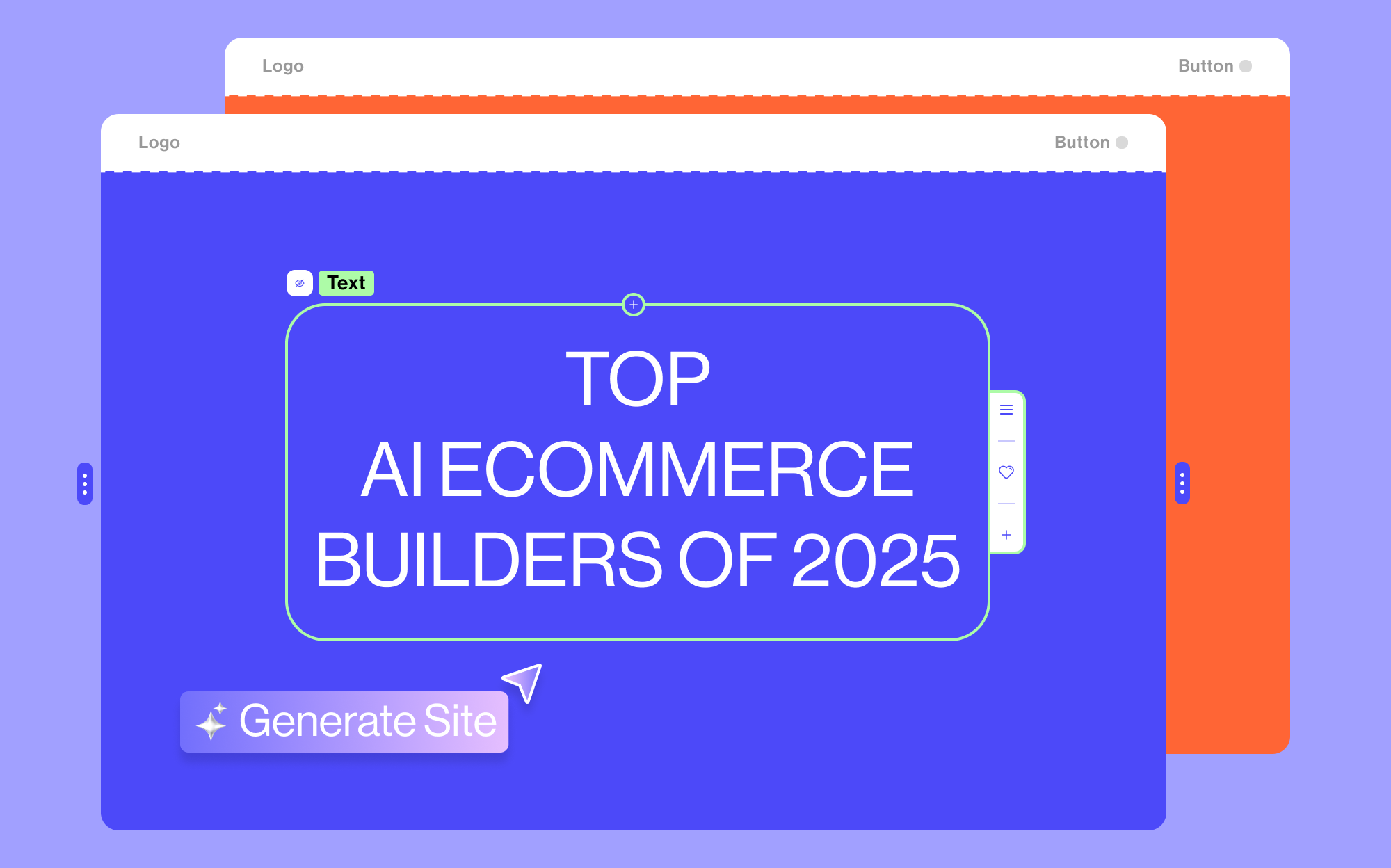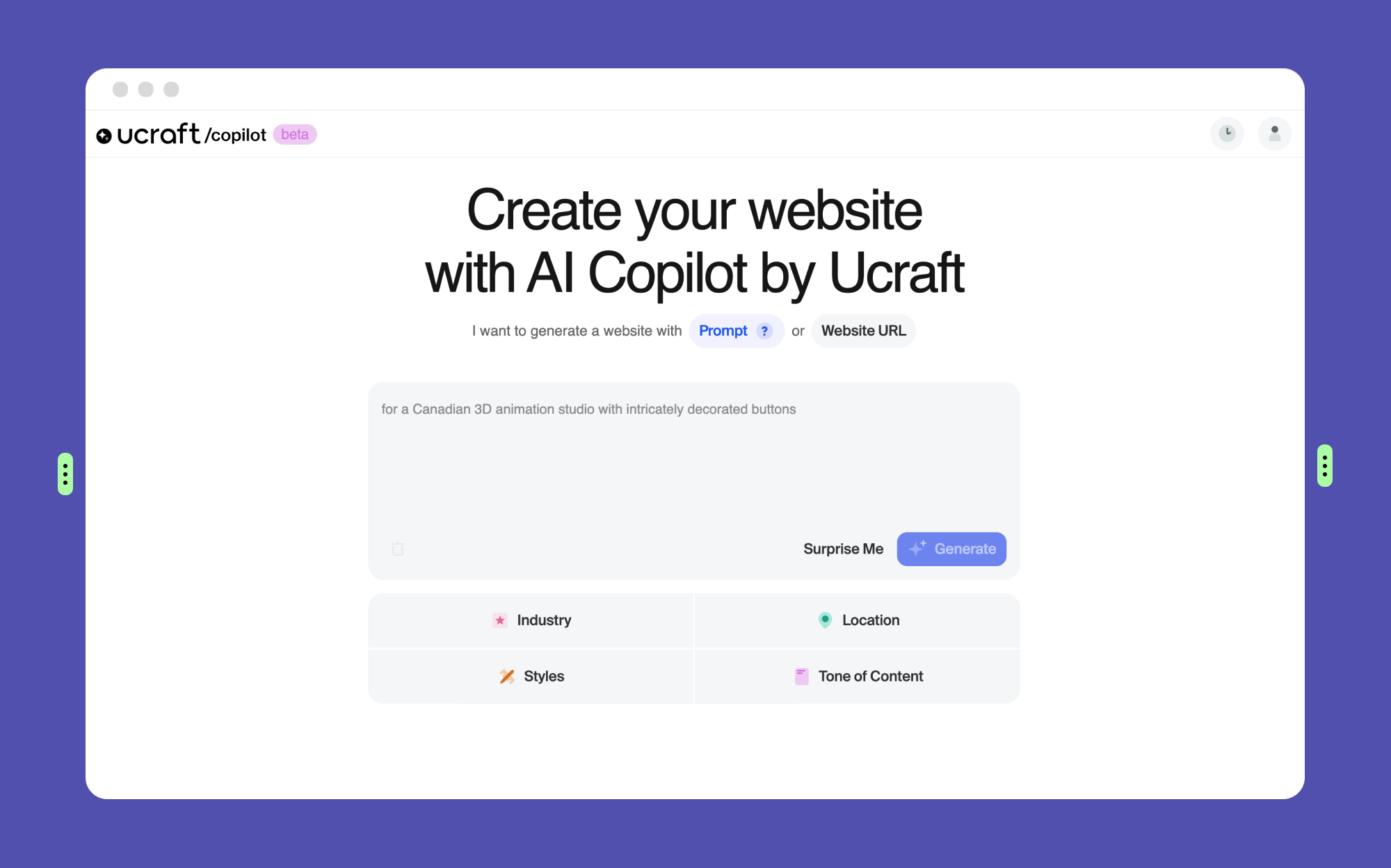
The Best AI-Powered eCommerce Website Builders of 2025
If you've been waiting for the right time to start an online store, 2025 is it. While no-code eCommerce builders have been making it easier to launch and grow online businesses for years, AI has redefined the very concept of “easy”.
Think builders that generate unique designs, write SEO-optimized copy, and set up complex features that used to require days of configuration - all based on simple prompts. The tech is here, it works, and it's surprisingly affordable.
But here's the catch: the market is suddenly flooded with dozens of platforms claiming to be "AI-powered." Some use the term to describe basic chatbots, while others offer genuine AI that works alongside you (or rather - instead of you) to build and optimize your store. The difference in impact is massive, but the difference in pricing often isn't.
That's why we have thoroughly tested every major platform on the market and assessed them on capabilities that actually impact your bottom line.
Here are the 5 AI-powered eCommerce builders actually worth your money in 2025.
What makes a great AI-powered eCommerce website builder?
Before we get into our top 5, let’s break down what makes an AI-powered eCommerce builder truly stand out.
-
AI power: Is it genuinely powered by artificial intelligence, or just basic automation dressed up as AI? Can it understand and deliver on specific prompts? True generative AI should leverage complex algorithms and web data to generate outputs (including images) uniquely relevant to each user prompt.
-
eCommerce features: Does it come with all the essential tools for online selling, like payment processing, order fulfillment, discount management, appointment booking, analytics tools?
-
Productivity and time-saving: Does it reduce or simplify your workload in a significant way? Are we talking days saved on crucial processes, or just seconds shaved off simple tasks?
-
Ease of use: Is it as simple as writing a prompt, or is there a steep learning curve?
-
Quality of output: Most importantly, does the final store look and perform like it was built by a pro?
How did we test for all this? Simple.
We used every AI-powered builder to create a site for a fictional plant store in Copenhagen, Denmark. We gave each AI the same specific requirements:
-
Emphasize ease of care throughout site content
-
Use minimalistic design with striking photography
-
Show customer testimonials on the home page
-
Include a built-in appointment booking system
-
Use a green, white, and black color scheme
-
Apply Helvetica-style, lowercase-only typography
-
Highlight 4-5 reasons to buy, including same-day delivery
-
Add a separate FAQ page, with 3-4 relevant questions
Let's meet the platforms that delivered the best results.
5 Best AI-powered eCommerce Builders of 2025
-
Ucraft Next: Best all-in-one AI-powered eCommerce solution
-
Shopify: Best eCommerce platform for established retailers
-
Wix: Best web builder in terms of design freedom
-
Squarespace: Best web builder for boutique businesses
-
Strikingly: Best web builder for single-page stores
1. Ucraft Next
Launched recently by the team behind Ucraft, one of the most popular pioneer web builders with over 1 million users worldwide, Ucraft Next is the ultimate all-in-one eCommerce solution for online businesses of all sizes.
The platform is as advanced as it is user-friendly and stands out for its equally powerful eCommerce and design capabilities.
Ucraft Next comes with several AI-powered features and tools, the most exciting of which is the UC Copilot - an intelligent website-building assistant that generates fully functional sites in minutes, based on a simple text prompt.

Ease of use 11/10
The building process is as straightforward as can be. All you need to do is write your prompt, hit generate, and watch the AI to create your store.
Extra point for the ability to generate a store without creating an account or signing up for a trial - in fact, you can test the tool as many times as you'd like without entering so much as your email.
AI power 10/10
The builder perfectly delivered on every aspect of the prompt - design, content, and functionality. It generated exactly what we asked for: a complete store with the specified color scheme, built-in appointment booking tool, ease-of-care messaging throughout, testimonials on the home page, the requested typography, and an FAQ page.
It’s worth noting that, though we never specified what the appointment system was for - the AI automatically set it up for plant care consultations. Details like this prove it's genuine AI at work.
Productivity and time-saving 9/10
The UC Copilot generated the website, complete with copy and features, in 2.3 minutes. This alone is a giant time-saver, but let’s get into some of the other (AI-powered and not only) productivity boosters provided by Ucraft Next.
-
Conversational AI bot for writing product descriptions
The bot writes fully custom, SEO-optimized product copy in your brand voice based on a few keywords. This can potentially cut days off your workload, especially for stores with large inventories.
-
All-in-one dashboard
All essential aspects of your store - products, payments, order fulfillment, discount, analytics, team collaboration - are configured and managed in one interface. If you’ve ever had to juggle multiple systems to deal with different parts of your online business, you can guess how much time this unified dashboard will save you. And the best part is, the dashboard is fully accessible on the iOS/Android Merchant App.
-
Design features
For those of us who can never be satisfied with AI-generated design (specifically, users with some design experience), Ucraft Next’s advanced Visual Editor comes with several productivity-boosting features. Special mention to the Collections tool for letting you create and reuse templates for repetitive content like blog posts and team pages.
Another special mention to the Design System for keeping your colors, typography, and UI elements consistent automatically - no more manual checks for brand consistency.
-
Team collaboration
You might think multiple people working on one site makes things go faster. But often, the opposite happens - teammates get in each other's way and it becomes hard to track who's doing what.
Ucraft Next solves this productivity trap by letting you assign each team member to a specific task, customize their access levels and permissions, and track everyone's progress in one interface.
eCommerce capabilities 10/10
Ucraft Next’s website builder comes with a full suite of designed-to-sell features, including payment processing, delivery management, discount systems, marketing and analytics tools, ticketing and appointment booking systems, support for a range of product types, conversion-optimized checkouts, cart abandonment recovery, etc.
This AI-powered builder can be easily classified as an all-in-one eCommerce solution.
Support quality 9.5/10
The first layer of support is Hoory AI - an intelligent conversational assistant trained to answer 90%+ of inquiries related to building with Ucraft Next.
But if you prefer to talk to a human, the support team is available 24/7, responds within 5-10 minutes, and speaks multiple languages, including English and Arabic.
Quality of output 10/10
While the criteria evaluated above are certainly important, the primary reason why Ucraft Next is the best AI-powered eCommerce builder is ultimately the end result - the website itself.
After 2.3 minutes of AI generation and 48 minutes of additional setups (to configure a few payment and delivery options, add some products, etc.), we were able to build an eCommerce store that not only meets all the requirements specified in the brief, but also:
-
Accepts payments in cash, credit/debit cards, and PayPal.
-
Fulfills orders via self-pickup and DHL.
-
Has 3 team members working on it, each with different permission levels.
-
Lets users book appointments online.
-
Has fully SEO-optimized website content, complete with metadata.
-
Is integrated with Ucraft Next’s free marketing and analytics tools.
Best for
Based on its unmatched combination of sophisticated eCommerce features, cutting-edge design capabilities, and all-around simplicity, Ucraft Next (and its AI-powered UC Copilot) is best for start-ups, SMEs, and large enterprises looking for a one-stop-shop for all their eCommerce needs.
2. Shopify
Shopify is one of the most popular eCommerce builders on the market. It provides a rich set of features tailored specifically for online selling - a wide range of professionally designed templates, easy integration with various payment gateways, robust inventory management tools, a huge community of sellers, and more.
The platform comes with several intelligent features - collectively named Shopify Magic - promising a boost in productivity, creativity, and sales volumes.
Ease of use 8.5/10
Unlike Ucraft Next, Shopify doesn't have AI that builds your site from a text prompt. Instead, you follow the traditional route - sign up for a trial, pick a theme, customize it, add products, and so on.
Though Shopify isn't hard to use overall, creating a store that matched our specific requirements for design, content, and features took over 2 hours of work. For perspective, just signing up took almost as long as UC Copilot needed to generate an entire store.
AI power 4/10
While Shopify's AI tools don’t help build your store from the ground up, they do come handy once you've completed the initial design and setup. The platform offers three AI-powered features: image editing, product description writing, and FAQ generation.
The most useful AI tool by far is the product page generator - it helps you write product descriptions, suggests relevant keywords, and guides you through pricing, categorization, and other processes. If we were to rate this tool separately, we’d give it 10/10.
The image editing tool is basic, offering standard functions like crop, resize, flip, and rotate. While you can find these features in many free online tools, having them built into the platform is an advantage, particularly for image-heavy stores.
Lastly, the FAQ generator is a straightforward conversational AI tool that creates natural-sounding answers to common questions, using information provided by you or available online.
Productivity and time-saving 9/10
Shopify's AI capabilities may be limited, but there's a good reason it made our list of top eCommerce builders: despite the lack of advanced AI features, the platform offers a sophisticated set of tools designed to streamline the work of online sellers.
Some of our favorite time-savers include: the inventory synchronization system that tracks product movement in real-time and eliminates stock updates, the Shopify POS app that turns your phone or tablet into an in-person selling tool, the built-in loyalty system that requires no third-party integrations, and the Shopify Email tool that enables you to create and run email campaigns right from your dashboard.
eCommerce capabilities 9/10
As one of the leading eCommerce-first web builders, Shopify offers a comprehensive set of eCommerce tools, but two factors affect its overall value: mandatory transaction fees on each sale, and the need to purchase additional plugins for essential features like advanced reporting and custom shipping options.
Support quality 6/10
Shopify offers standard 24/7 support through chat, email, and phone, along with extensive documentation. However, responses usually start with generic scripts, complex issues frequently require multiple escalations, and email support can be slower than advertised. While basic technical problems are resolved quickly, advanced issues often end up requiring help from paid Shopify Experts. The quality of support also varies significantly between agents, with billing and payment issues being particularly challenging to resolve.
Quality of output 7/10
Despite Shopify's strength in eCommerce features, its design capabilities can feel frustratingly limited. Yes, the themes look professional, but they appear to follow similar patterns that are hard to break free from.
The built-in customization tools offer variations rather than true creative freedom - even basic layout changes often run into restrictions. This can be especially problematic for businesses where design really matters, like art galleries, photography portfolios, or luxury brands. Even with custom coding knowledge, you'll spend more time working around the platform's limitations than bringing your vision to life.
If we were to assess the quality of sites built with Shopify based exclusively on eCommerce features, the rating would have been considerably higher. However, when taking the visual experience into consideration, there certainly is significant room for improvement.
Best for
Shopify is best for established retailers looking for a scalable platform to grow their online stores without extensive technical knowledge.
3. Wix
Renowned for its intuitive drag-and-drop functionality, focus on aesthetics and extensive template collection, Wix was one of the first widely used no-code platforms to introduce an intelligent website generator.
The Wix AI Website Builder operates like a conversational assistant, asking you a series of questions and building a preliminary website layout tailored to your responses.
On top of the site generator, Wix has a constantly growing lineup of more targeted AI-powered tools, like its smart text creator, section builder, theme assistant, image auto-enhancement, object eraser, and more.
Ease of use 8/10
The AI generation process is completely stripped of complexity - simple questions about your brand, product, business goals, and history. The wait time for the rough website draft is about 2 minutes.
If you're pleased with the AI-generated output, you can proceed to refine it using the Wix Editor, which requires an additional 2.5-3 minutes to load, and a few hours to figure out.
Although Wix is quite user-friendly for customizing design elements, adjusting the functionality and configuring eCommerce settings does require a steeper learning curve. Unfortunately, despite Wix's extensive collection of AI tools, none of them appear to be specifically designed to streamline eCommerce-related tasks.
AI Power 6.5/10
The Wix AI builder does generate a mostly functional site based on a text prompt; however, getting it to produce a site that fully complies with specific requirements is quite a challenge, even when the requirements are fairly straightforward.
Evaluating the quality of Wix AI based on how closely it executed the brief, we have to deduct points for not following the color scheme, disregarding the lowercase requirement, failing to showcase any testimonials on the home page, and most importantly, not creating a built-in appointment tool.
On a positive note, the Wix AI did include some helpful sections that we didn't specifically request, such as the Top Picks section and a special promotional deal.
Productivity and Time-Saving 9/10
Wix boasts with a rich toolkit of efficiency boosters, with the latest additions primarily including AI-powered tools. We tested them all, and here are our favorites:
-
Portfolio Creator
This super-intuitive tool simplifies the process of showcasing your work online. By leveraging AI image clustering technology, it automatically groups your media and suggests titles and descriptions for each project, allowing you to easily create a compelling online portfolio.
-
Alternative Layouts Tool
This is a pretty unique tool for design experimentation. With just a click, you can explore a variety of preset layout options that instantly rearrange your site content, allowing you to find the perfect composition that enhances user experience and visual appeal.
-
Ad Campaign Tool
Wix allows you to design and launch Google and Facebook ads right in your dashboard, potentially saving you hours for each campaign you run.
eCommerce capabilities 6/10
Wix's eCommerce offering, while user-friendly, lags behind competitors like Shopify and Ucraft Next in critical areas. The platform's limitations in product variants, inventory management, and advanced analytics create real bottlenecks for growing businesses. Factor in basic reporting and restricted bulk editing capabilities, and it becomes clear that while Wix might serve small starter stores, serious merchants should look to more robust alternatives for long-term scalability.
Quality of Output 7.5/10
In terms of the end result, Wix is the exact opposite of Shopify. You can easily build a beautiful, unique site and refine it with a wealth of AI tools, but turning it into a high-conversion store in less than a day is a challenge.
Best for
With a stronger focus on visual experiences than eCommerce, Wix is best suited for users seeking to build a visually appealing online store with solid design options and basic eCommerce tools.
4. Squarespace
Similar to Wix, Squarespace is best categorized as a website builder with eCommerce functionalities. The platform stands out with an extensive template gallery and thorough creative control over site design.
Ease of use 7/10
The AI starts by asking you to choose from a limited number of website topics and goals.
Next, you have the choice between using a template or building with AI - naturally, we went with AI.
From there, you have to choose from limited personality options - we selected Friendly, since Caring wasn't available.
Next, you choose sections for your Homepage - while the list includes most standard content blocks, there was no option for Testimonials.
Moving to other pages, you are once again faced with a limited list. From the pages needed in our brief, the FAQ page was missing.
Finally, you choose from preset color schemes - fortunately, one closely matched our preferred white-black-green palette.
While technically straightforward, the limited options at every stage and the inability to write custom prompts make the process feel restrictive and confusing.
AI power 5.5/10
Let's analyze the output against our brief requirements. The first red flag appears with topic selection - despite our store name clearly indicating "Plant Store," the tool's limited categories forced us to select "Flowers" as the closest match. The result? A website designed for a flower shop rather than a plant store.
The tool's limitations become more apparent when examining our specific requirements. With no way to specify typography, design, content, and structure preferences, meeting our brief was technically impossible from the start - as a result, we have no testimonials, no FAQ page, no easy-to-care messaging, and no lower-case typography.
The website generated by Squarespace AI is visually quite appealing, but taking into account the rigid, pre-determined flow and highly restricted options at each step, this appears to be less of an AI system and more of a template configurator with predefined paths.
Productivity and time-saving 8/10
While Squarespace's AI website builder falls short on meeting specific business needs, the Squarespace Design Intelligence toolkit proves much more valuable. This suite of AI tools assists with brand identity development, product descriptions, SEO optimization, email marketing, and website setup.
The standout features are the Email Campaign Generator and Blogpost Generator. Both writing tools analyze your existing website content and tone to maintain consistent brand messaging across channels, potentially saving hours of content creation time.
eCommerce capabilities 7.5/10
Squarespace's eCommerce solution delivers essential store features including product management, inventory tracking, and multiple payment options like PayPal and Stripe. The platform excels in visual presentation through polished templates and seamless store integration, making it ideal for design-focused businesses.
The limitations, however, are significant - restricted checkout customization, basic inventory management compared to dedicated platforms like Shopify, higher transaction fees on lower-tier plans, and limited third-party integrations can constrain business growth.
Support quality 8/10
Squarespace offers comprehensive support through multiple channels, including knowledge base, forums, videos, and blogs, with 24/7 assistance available on all pricing plans.
While initial response times for live chat are pretty long (up to 1 hour), the support team provides thorough, expert guidance once engaged.
Quality of output 7.5/10
After generating the first (rather basic) starting point with AI, we were able to build out a complete, functioning online store in a single day. The additional 3 hours spent adding missing pages, and testimonials, optimizing content, and setting up payment and delivery options resulted in a store ready to process orders.
This impressive time-to-market efficiency, even with the AI builder's current limitations, is exactly why Squarespace earns its place among our top eCommerce builders for 2025.
Best for
Squarespace is perfect for creatives and boutique businesses who want a beautifully designed eCommerce site with a focus on aesthetics and basic AI tools.
5. Strikingly
While it may not have as many advanced features as some other builders, Strikingly’s ease of use and affordability make it a strong contender for those starting out.
Similar to Ucraft Next’s UC Copilot and Wix AI, Strikingly’s intelligent builder promises to build a fully custom website or eCommerce store in minutes with a text prompt.
Ease of use 10/10
Strikingly's AI builder begins with a short form where you input your project details, preferredtone of voice, language preferences, and choose between single or multiple-page layouts. After completing the form, a one-click signup process initiates the site generation.
The AI takes approximately 1.5 minutes to generate three design options. If none meet your needs, you can generate three new alternatives with a click. In our case, we were able to choose a design that largely matched our brief's requirements on the first try.
On the whole, the AI generation flow is remarkably streamlined.
AI Power 9.5/10
Visually, the store designed by Strikingly AI is not as impactful as those produced by Wix, Squarespace, and UC Copilot. However, this modest-looking online shop does meet 7 out of the 8 requirements of our brief - the only component missing is the appointment booking tool.
In addition to executing most of the tasks in the prompt, this AI builder generated 3 well-written product pages, a few relevant blog post titles, and a fully functional contact form.
This ability to add valuable, contextual elements beyond the basic requirements demonstrates that this is genuine AI at work - not just a template configurator, but a system capable of understanding business context and expanding upon the initial brief in meaningful ways.
Productivity and time-saving 8/10
In contrast to its impressive ability to generate sites customized to specific business needs, Strikingly’s efficiency-boosting features are quite basic. In fact, the only tools that appear to be specifically aimed at cutting time and effort are the AI generator and the drag-and-drop editor.
Nevertheless, the significant time savings from the AI builder alone justify a high productivity rating for this platform.
eCommerce capabilities 5.5/10
Strikingly’s online selling platform is aptly named Simple Store. eCommerce features are easy to use, but rudimentary, lacking advanced tools like multi-channel selling, built-in systems, integrations, and complex inventory management.
Support quality 10/10
Strikingly's live-chat support team is quick and knowledgeable, responding to queries in about 8 minutes. The agents stay with you until your issue is resolved, without dropping the conversation or leaving questions unanswered.
Quality of output 8/10
The final websites you can create with Strikingly deliver impressive value, especially considering the quick turnaround. Starting from the AI-generated foundation, you can launch a highly customized site within hours, complete with your brand's unique look and feel. The platform handles both physical and digital product sales, making it possible to go from zero to actively selling in the same day.
The only notable drawback is Strikingly's basic eCommerce functionality - you won't find the advanced features of dedicated eCommerce platforms here. However, given its affordable pricing and the ability to create and launch a fully custom online store so quickly, Strikingly proves to be a solid choice for small businesses and entrepreneurs looking to start selling online.
Best for
Strikingly is best for individuals and small businesses looking for a fast and easy way to build a simple eCommerce website.
How to Choose the Right eCommerce Builder
Define Your Business Goals: Start by clarifying your business objectives. Are you looking to launch a small boutique, scale an existing online store, or create a complex multi-channel eCommerce site? Your goals will influence the type of builder that best suits your needs.
List Your Must-Have Features: Identify the core features your online store needs. This might include payment processing options, inventory management, shipping integrations, or marketing tools. Create a checklist of these must-have features to narrow down your options.
Assess Design Requirements: Consider how important design flexibility is for your store. If you need a highly customizable design, look for builders that offer advanced design tools and template options. If you prefer simplicity, a builder with a range of pre-designed templates might be sufficient.
Test Customer Support: Reliable customer support can be a lifesaver. Check the support options available and read reviews to choose a builder that comes with timely and effective assistance.
By following these steps, you can systematically evaluate eCommerce website builders and select one that aligns with your business needs. Remember, the right choice will depend on your specific requirements, so take the time to assess each option thoroughly.
Conclusion
In today’s digital era, having an eCommerce store is not just a smart business move - it's an absolute must.
With the right eCommerce website builder, you can transform your business vision into a high-conversion online store with ease and efficiency. The five platforms highlighted here each offer unique strengths and cater to different needs, from affordability and simplicity to advanced customization and multi-channel integration.
Related posts
446,005 entrepreneurs like you already have a head start
Become one of them by getting world-class expertise delivered into your inbox, for free.












